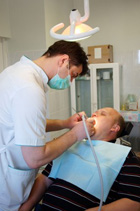 Dry mouth, also known as xerostomia is a symptom of other conditions that affect the oral cavity that causes the production of saliva to stop. Saliva is very important in the oral cavity because it moistens the mouth, allowing easier eating, and also washes the teeth and removes plaque and bacteria. In essence, it is the body’s natural defence against dental disease.
Dry mouth, also known as xerostomia is a symptom of other conditions that affect the oral cavity that causes the production of saliva to stop. Saliva is very important in the oral cavity because it moistens the mouth, allowing easier eating, and also washes the teeth and removes plaque and bacteria. In essence, it is the body’s natural defence against dental disease.
This is why when the production of saliva stops you are far more likely to experience dental problems such as cavities and bad breath. There are a number of main causes of dry mouth including: side effects of medicine you are taking; complications from other diseases; dehydration; and as the result of radiotherapy.
Dry mouth can be quite unpleasant and cause a sore throat, dry lips and nasal passages and also lead to a difficulty eating and drinking. Dry mouth often remains a problem for as long as the underlying cause remains a problem. This means that for the duration of the symptoms you are at an increased risk of dental cavities and gum disease.
It is important therefore, to see a dentist if you are suffering from dry mouth to make sure you are not putting your dental health at an increased risk. Your Central Leeds dentist will also recommend that you practice good standards of oral hygiene for as long as the symptoms last. This will help to remove the bacteria and plaque form the teeth and offer a greater degree of protection to the teeth. You can also drink plenty of water to moisten the mouth and wash away plaque and food particles that may remain in the mouth due to a lack of saliva. It is also a good idea to avoid salty foods and especially smoking, which can make the symptoms much worse.





 Losing your teeth can be a very traumatic event at any stage in life. Missing teeth can make it very hard to do even the simplest of everyday activities such as eating, drinking and talking. The hollows left by missing teeth also act as very welcoming places for bacteria and plaque to build up and attack gums. Even when the teeth are missing, the health of your gums is still very important as gum disease can be really unpleasant and also has strong ties to heart disease.
Losing your teeth can be a very traumatic event at any stage in life. Missing teeth can make it very hard to do even the simplest of everyday activities such as eating, drinking and talking. The hollows left by missing teeth also act as very welcoming places for bacteria and plaque to build up and attack gums. Even when the teeth are missing, the health of your gums is still very important as gum disease can be really unpleasant and also has strong ties to heart disease. Teeth can be lost for a number of reasons. However, some of the most common are due to decay, gum disease or as the result of an accident such as a sporting injury or road accident. When the tooth is lost it can have a severe impact on both the aesthetic appearance of the teeth and the health of the mouth and face.
Teeth can be lost for a number of reasons. However, some of the most common are due to decay, gum disease or as the result of an accident such as a sporting injury or road accident. When the tooth is lost it can have a severe impact on both the aesthetic appearance of the teeth and the health of the mouth and face. Tooth decay is caused by a build up of a filmy, sticky substance called plaque that coats the teeth and releases acid which erodes the protective enamel layer. This causes small holes called cavities to appear in the teeth allowing bacteria to penetrate to the sensitive inner area of the tooth. Inside the tooth is the dental nerve housed in a casing of a softer material called pulp. If bacteria gets into this part of the tooth it can cause an infection that will not only be painful but could result in the death and eventual loss of the tooth.
Tooth decay is caused by a build up of a filmy, sticky substance called plaque that coats the teeth and releases acid which erodes the protective enamel layer. This causes small holes called cavities to appear in the teeth allowing bacteria to penetrate to the sensitive inner area of the tooth. Inside the tooth is the dental nerve housed in a casing of a softer material called pulp. If bacteria gets into this part of the tooth it can cause an infection that will not only be painful but could result in the death and eventual loss of the tooth. Tooth decay is caused by a build up of a filmy, sticky substance called plaque that coats the teeth and releases acid which erodes the protective enamel layer. This causes small holes called cavities to appear in the teeth allowing bacteria to penetrate to the sensitive inner area of the tooth. Inside the tooth is the dental nerve housed in a casing of a softer material called pulp. If bacteria gets into this part of the tooth it can cause an infection that will not only be painful but could result in the death and eventual loss of the tooth.
Tooth decay is caused by a build up of a filmy, sticky substance called plaque that coats the teeth and releases acid which erodes the protective enamel layer. This causes small holes called cavities to appear in the teeth allowing bacteria to penetrate to the sensitive inner area of the tooth. Inside the tooth is the dental nerve housed in a casing of a softer material called pulp. If bacteria gets into this part of the tooth it can cause an infection that will not only be painful but could result in the death and eventual loss of the tooth. One of the first things we notice about people when we first meet them is their smile and their teeth, so if the teeth are beautiful it is very noticeable. However, it is just as noticeable when the teeth are not so attractive to look at. Crooked teeth can really spoil the appearance of a beautiful smile and look quite unpleasant. In today’s world where image and self-confidence is so important, being unhappy with how you look could be the source of great anxiety.
One of the first things we notice about people when we first meet them is their smile and their teeth, so if the teeth are beautiful it is very noticeable. However, it is just as noticeable when the teeth are not so attractive to look at. Crooked teeth can really spoil the appearance of a beautiful smile and look quite unpleasant. In today’s world where image and self-confidence is so important, being unhappy with how you look could be the source of great anxiety. The oral health of your child is of very great importance and significance as it can affect the health of their teeth for the rest of their lives. It is our responsibility as parents to ensure that we do all we can to look after the health of our children’s teeth to give them the best possible start in life.
The oral health of your child is of very great importance and significance as it can affect the health of their teeth for the rest of their lives. It is our responsibility as parents to ensure that we do all we can to look after the health of our children’s teeth to give them the best possible start in life. Dental cavities are one of the most common health complaints in the UK every year. Millions of people each year need treatment for dental cavities of varying degrees of severity, but what exactly are cavities? What causes them and why do they require treatment?
Dental cavities are one of the most common health complaints in the UK every year. Millions of people each year need treatment for dental cavities of varying degrees of severity, but what exactly are cavities? What causes them and why do they require treatment? Bad breath can affect all of us at certain times. It can be particularly embarrassing and difficult because it is almost impossible to know if you are suffering from it. This is why so many people are anxious and resort to all sorts of lengths to make sure their breath is fresh. Just search the internet to see how many different cures and secret remedies are available if you part with your hard earned money. There is certainly a lot of money exploiting people’s anxieties and fears.
Bad breath can affect all of us at certain times. It can be particularly embarrassing and difficult because it is almost impossible to know if you are suffering from it. This is why so many people are anxious and resort to all sorts of lengths to make sure their breath is fresh. Just search the internet to see how many different cures and secret remedies are available if you part with your hard earned money. There is certainly a lot of money exploiting people’s anxieties and fears. More and more teenagers and adolescents in the UK are being treated with orthodontic braces. These are straightening devices made from plastic, ceramic and metal that are attached to the teeth in an effort to manipulate them into a more aesthetically pleasing position. Braces are used to treat a variety of alignment, spacing and bite issues
More and more teenagers and adolescents in the UK are being treated with orthodontic braces. These are straightening devices made from plastic, ceramic and metal that are attached to the teeth in an effort to manipulate them into a more aesthetically pleasing position. Braces are used to treat a variety of alignment, spacing and bite issues

